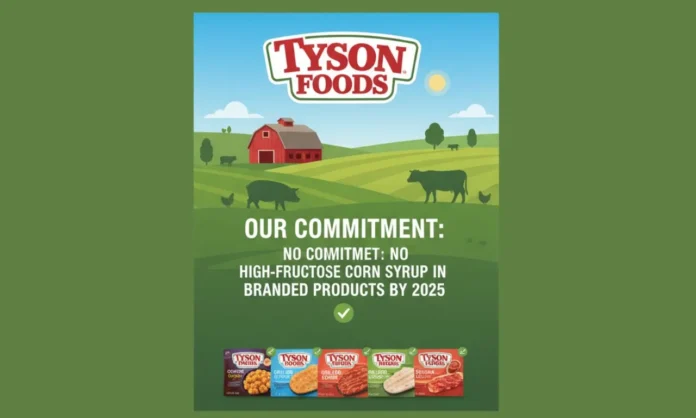Tyson Foods has said it plans to stop using high fructose corn syrup and several other ingredients in its branded products across the United States by the end of 2025. The announcement covers a wide portfolio, including Tyson®, Jimmy Dean®, Hillshire Farm®, Wright®, State Fair®, Aidells®, ibp® and others.
The list of ingredients being removed includes High Fructose Corn Syrup, Sucralose, BHA/BHT and Titanium Dioxide. All of these remain approved for use by the FDA and are considered safe, but Tyson is choosing to remove them voluntarily. The move comes only months after the company already eliminated petroleum-based synthetic dyes from its domestic branded products, part of a steady shift toward simpler formulations.
Company president and CEO Donnie King said the decision was not about regulation, but about listening to shoppers. “We continuously review and assess our product portfolio to ensure the highest quality products that meet the needs of consumers,” he explained. According to him, Tyson wants to keep the taste and value of its brands while still answering consumer demand for cleaner labels.
For the supermarket industry, the implications are fairly direct. Reformulation at this scale usually requires testing and adjustments, and buyers will be watching to see how quickly updated products reach the shelf. When a company the size of Tyson makes a change, it tends to set expectations across whole categories. Frozen foods, processed meats and ready-to-eat snacks are all areas where these shifts will show up first.
This initiative also builds on Tyson’s broader nutrition work. In recent years, the company has been reducing sodium and sugars in many of its products, looking for ways to simplify recipes without cutting corners on price or flavor. That balancing act—keeping food affordable and familiar while shifting away from additives—isn’t easy, but Tyson is signaling it wants to stay ahead of the trend.
Consumer demand is driving much of this. Shoppers have been asking for fewer additives and more natural ingredients for years, and retailers have leaned on suppliers to respond. Private label brands often moved first, and now national brands are catching up. For supermarkets, Tyson’s decision means some private label differentiation could narrow, especially in categories where “no HFCS” or “no artificial ingredients” had been a clear selling point.
From a supply chain view, these kinds of changes ripple outward. Ingredient suppliers may lose demand for certain sweeteners or preservatives, while natural alternatives could see more business. Retailers will need to track packaging updates and manage transitions to avoid empty slots. These are operational issues, but they matter when brands as large as Tyson roll out new formulations.
There’s also a longer-term context. Public conversations around food additives, especially artificial dyes and sweeteners, have grown louder. While FDA still considers the listed ingredients safe, consumer trust is often shaped more by perception than by scientific detail. Tyson’s move reflects this reality—it’s about protecting brand reputation as much as about reformulating the food itself.
With around 138,000 employees and some of the biggest protein brands in the country, Tyson Foods has the scale to influence the direction of supermarket categories. By setting a clear timeline—the end of 2025—the company is giving retailers, suppliers and consumers a straightforward marker to measure progress.
In the end, Tyson’s step to remove high fructose corn syrup, sucralose, BHA/BHT and titanium dioxide is a sign of how the supermarket industry is evolving. National brands now face the same pressure as private labels to deliver food that feels cleaner, safer and closer to what families want today. For retailers, it’s one more signal that additive reduction is not a niche trend anymore, but a mainstream expectation.



